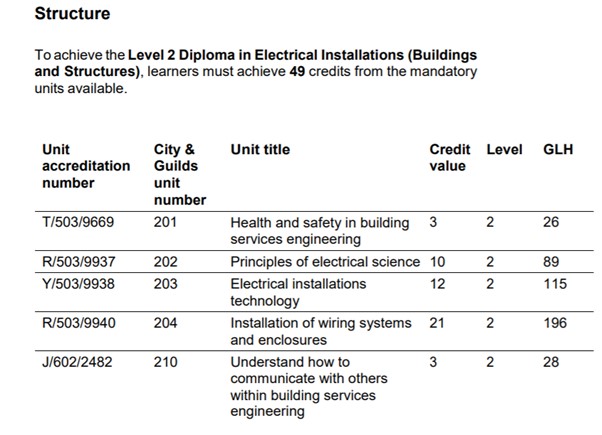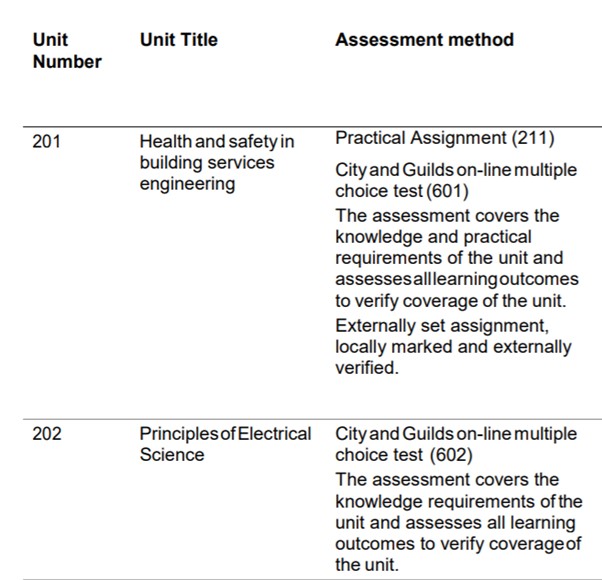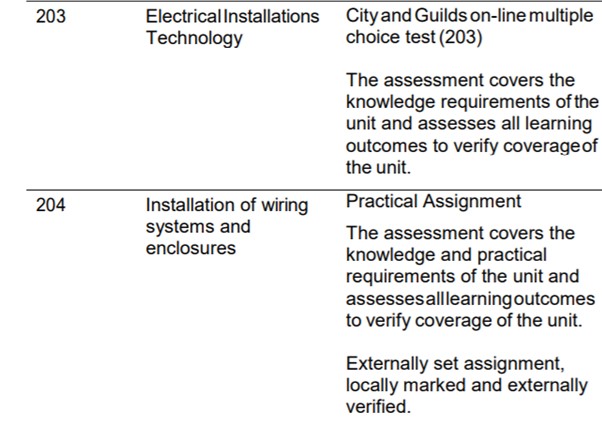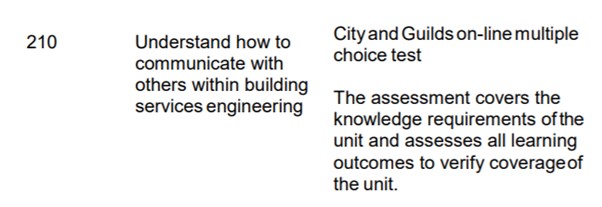Course Description
Who is the qualification for?
For candidates who want to work as electricians in the building services engineering sector. This qualification does not make candidates fully qualified electricians
What does the qualification cover?
It allows candidates to learn, develop and practise the skills required for employment and/or career progression in the electrotechnology sector.
Structure

Unit 201 Health and safety in building services engineering
This combination unit provides learners with the essential health & safety knowledge and skills to demonstrate best practice in a business services engineering environment or sector. The unit provides learners with an awareness of relevant legislation and should underpin all business services engineering activities learners take part in.
Health and safety behaviour learned in this mandatory unit should be displayed in all areas.
- Understand how relevant legislation applies in the workplace.
- Understand the procedures for dealing with Environmental and Health and Safety situations in the work environment.
- Be able to demonstrate and understand the procedures for establishing a safe working environment.
- Understand the requirements for identifying and dealing with hazards in the work environment.
Unit 201 Health and safety in building services engineering
This unit is assessed by two mandatory components (211)Assignment and (601) online evolve test.
The aim of this unit is to enable the candidate to know the basic principles of electrical science. This knowledge provides the foundation for electrical installations which can be applied when designing wiring systems for clients and when inspection and testing electrical installations.
- Understand mathematical principles which are appropriate to electrical installation, maintenance and design work.
- Understand standard units of measurement used in electrical installation, maintenance and design work
- Understand basic mechanics and the relationship between force, work, energy and power
- Understand the relationship between resistance, resistivity, voltage, current and power
- Understand the fundamental principles which underpin the relationship between magnetism and electricity
- Understand the types, applications and limitations of electronic components in electrical systems and equipment
Unit 202 Principles of Electrical Science
This unit is assessed by one mandatory component (602) evolve test.
Unit 203 Electrical installations Technology
The purpose of this knowledge unit is for the candidate to gain knowledge of the underpinning principles and industry standards and requirements of electrical installation technology. They will know about sources of information and the types of information they provide about wiring systems. They will also know about earthing systems and the installation of wiring systems.
- Know implications of electrical industry regulations
- Know how to obtain technical information
- Know wiring systems of electrical installations
- Know requirements earthing systems
- Know how electricity is supplied
- Know requirements for different types of micro-renewable energies
Unit 204 Installation of wiring systems and enclosures
This practical unit will develop in learners the skills required to install wiring systems to recognised standards. Learners will learn to use tools and materials effectively in completing well defined tasks for electrical installations. In addition to learning to install systems, learners will also develop skills to inspect and test wiring systems.
- Know tools used to install wiring systems
- Know how to prepare for installing wiring systems
- Be able to install wiring systems
- Be able to bond mains services to main earthing terminal
- Be able to inspect a ‘dead electrical installation.
- Be able to test a dead electrical installation.
Unit 210 Understand how to communicate with others within building services engineering
This knowledge unit provides learning in the development and continued maintenance of effective working relationships in the building services industry associated with work in dwellings, industrial and commercial premises and for private and contract type clients.
- Know the members of the construction team and their role within the building services industry
- Know how to apply information sources in the building services industry
- Know how to communicate with others in the building services industry
Entry Requirements
City & Guilds does not set entry requirements for this qualification. However, as a centre we interview applicants to ensure that candidates have the potential and opportunity to gain the qualification successfully.
Age restrictions
This qualification is approved for learners 16+.
Assesment



Study Materials
The following books are required for the course and can be purchased directly through us or at participating book and online stores:
British Standard BS7671 17th Edition of the IEE Writing Regulations
Onsite guide
Progression
What opportunities for progression are there?
It allows candidates to progress into employment, although not as a fully qualified electrician, or to the following City & Guilds qualifications:
- Level3DiplomainElectricalInstallation (Buildings and Structures)
- Level 3 Diploma in Electrotechnology
- Level 3 Award in the Initial Verification and Certification of Electrical Installations
- Level 3 Award in the Periodic Inspection, Testing and Certification of Electrical Installations.
Accreditation of prior learning (APL)
Guidance on APL is available through contacting the centre.


